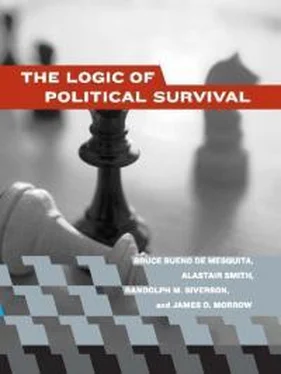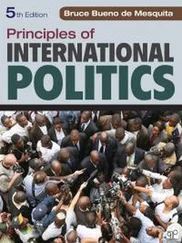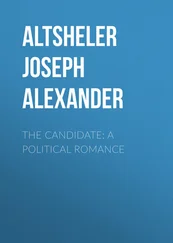In our undertaking, leaders are interested in enhancing their own welfare and so seek to produce what their supporters want. The phrase “their supporters,” however, is not shorthand for the citizens of the state. The behavior of leaders arises from their own self-interest in holding their positions. If that coincides with or is compatible with the welfare of the citizenry, many will benefit. If the welfare of a leader and the welfare of the society are at odds—and our theory and data will indicate that they often are—it is more likely to go well for the leader than for society.
High political office provides two primary paths by which leaders can derive satisfaction. Leaders may be motivated by a desire to pursue public policies they sincerely believe will enhance the public welfare. We think of such an orientation in leaders as being civic-minded, and perhaps it is. Abraham Lincoln’s declaration that “in giving freedom to the slave we assure freedom to the free,—honorable alike in what we give and what we preserve” is an apparent instance of such high-mindedness (Abraham Lincoln, Second Annual Message to Congress, December 1, 1862; in Lincoln [1862] 1991, 79). However, so too was Winston Churchill’s wartime declaration that he had not become the king’s first minister to preside over the dissolution of the British empire. And he was right. The British people swept the hero of World War II out of office at the first opportunity and replaced him with a prime minister, Clement Atlee, who decidedly would and did preside over the dissolution of that empire.
High office not only provides an opportunity to do good works. High office also holds out the prospects of great personal aggrandizement. Few, even among those who profess and demonstrate a strong commitment to the public welfare, leave office alive less well off personally than they had been when they came to power. Indeed, the quest for personal benefits seems to be a substantial motivation behind the competition for high office. Napoleon Bonaparte, for one, accumulated a personal treasury of 200 million francs at the height of his power, an immense fortune at the time (Schroeder 1994, 399). Unfortunately for him, he was not allowed to take it with him to St. Helena. Napoleon’s fortune should not be surprising. When the risks are large, so too must be the prospective compensation. Otherwise, who would take the risks? Still, however rational it may be from a cost-benefit perspective to pursue personal gain while in office, many tend to think of this as low-minded and base. Leaders interested in holding onto office can and do adjust their relative emphasis on personal aggrandizement and the national welfare in accordance with the requirements of the moment. We hope to demonstrate logically and empirically that a significant factor in those requirements emanates from the structure of institutions for selecting political leaders.
The theory proposed in the next two chapters emphasizes the circumstances under which leaders realize personal gains, promote public benefits, and create special benefits for their political allies. The degree to which they choose to emphasize one form of benefit over another is shown to depend on the selection institutions under which they operate. We are less interested in their personal inclinations to trade between the public good and their personal well-being than we are in identifying how selection institutions shape the profitability of such trades. After all, if particular institutions can ensure that even the most venal leader will nevertheless pursue the public welfare, then recognizing what those institutions are can make an important contribution to improving the quality of life around the world. At the same time, we recognize that even some autocrats can care enough about public policy to use the rents they extract to advance their own public policy vision. That is, while most autocrats are likely to use their office to benefit themselves and their backers, some—Lee Kwan Yew of Singapore is an exemplar—may choose to use the resources available at their discretion to advance public welfare. Nikita Khrushchev’s agricultural policies in the Soviet Union and Mao Zedong’s economic and cultural policies in China may be examples of such well-intentioned—but in these instances disastrous—uses of personal control over national resources for personal pet public policy projects.
We treat political survival as a necessary, but not a sufficient, condition for leaders to achieve other personal objectives, whether those other objectives involve policy goals, personal venality, or whatever. That is not to say that leaders cannot prefer to lose office, nor is it to say that leaders who want to hold onto office can always do so. Losing office is easy to do. It is especially easy for those who do not value holding onto office in the first place. We have no doubt that many people value other things above political survival. It is just that such people are not likely to find themselves in high office and so need not overly occupy our interest.
Threats to Political Survival
Political survival can be threatened in three distinct ways. These include domestic challenges to leadership, revolutionary challenges to individual leaders and the political systems they lead, and external threats in the form of military attack by foreign adversaries. Leaders can sometimes face these in combination. The basic tools to cope with each of these challenges are, we believe, the same, but the strategic responses by leaders (and followers) differ depending on the source of the threat.
Our central concerns here are with domestic challenges and external threats to political leadership. Although they represent less of our focus, we also address several features of revolutionary politics. Our approach provides an explanation of revolution and provides a partial explanation for institutional changes brought on by revolutions, a topic addressed in chapter 8. Indeed, we think of change as falling along an evolutionary/ revolutionary continuum rather than thinking of revolutions as categorically different from slower or subtler political changes (see Haber and Razo 2000 for a similar view). We offer an explanation of, for instance, the conditions under which monarchies become democracies or democracies revert to authoritarianism. We also provide an explanation for civil war and uprisings by the disenfranchised in which the existing political order is overthrown. In our perspective, the processes of revolution or civil war are not very different from the process of foreign intervention that results in the overthrow of a government and perhaps a change in its institutions. Additionally, we suggest that the motivations for emigration and revolution are similar. We also offer a tentative and partial explanation for why some successful revolutionaries select authoritarian rule while other successful revolutionaries adopt democratic principles of governance.
We propose a comparative theory of political-system change motivated by the notion that leaders want to keep their positions of power and privilege. Our focus differs in a subtle but important way from many historical treatments that view the gradual emergence of representative institutions as being the product of efforts by wealthy individuals to constrain the confiscatory, predatory inclinations of monarchs (Schultz and Weingast 1998) or as chance, path-dependent developments (Moore 1966; Tilly 1978; Skocpol 1998). Our approach also contrasts with those who view the emergence of political institutions primarily in terms of wealth-maximizing or rent-seeking behavior by political leaders, or in terms of differences in the motivations of democrats and autocrats (Olson 1993; Lake 1992; Niskanen 1997).
Notwithstanding our comments above about the venal, self-seeking behavior of some leaders, we assume that leaders care about both policy and personal aggrandizement. Leaders generally care to keep themselves in office so that they can allocate goods and, when possible, retain resources for their discretionary use. To stay in office, they must be attentive to the pressures they face from the institutions within which they operate and they must, when they can, adjust those institutions to suit their interests. Institutions change in response to events serious enough to threaten the political survival of leaders, and leaders choose actions to avoid or eliminate such political circumstances.
Читать дальше












